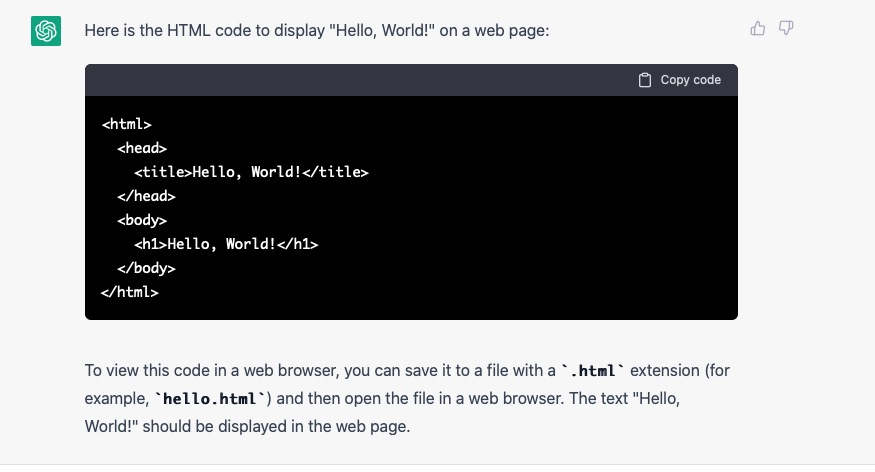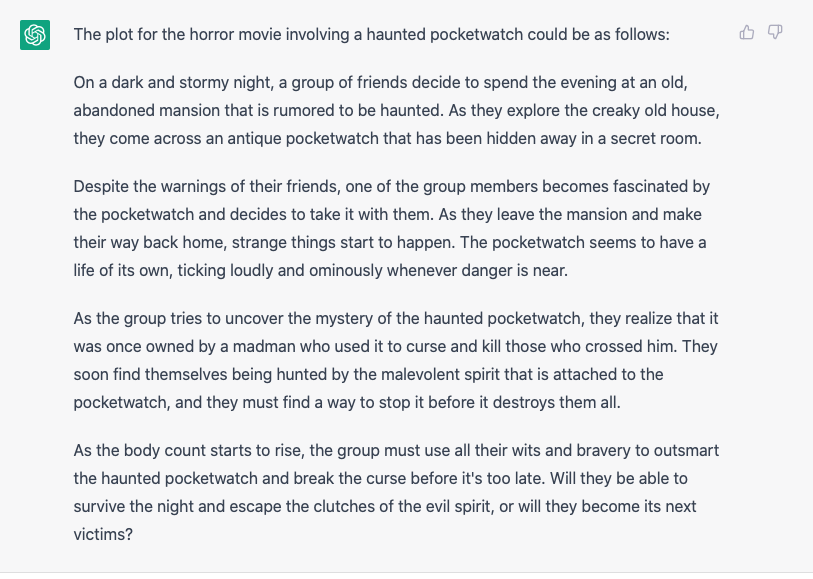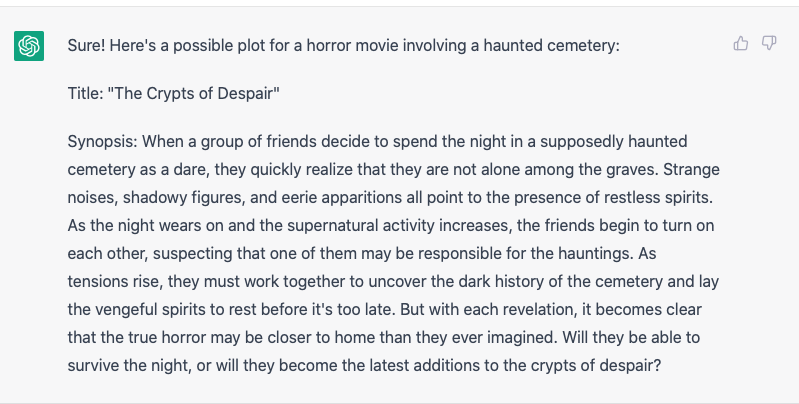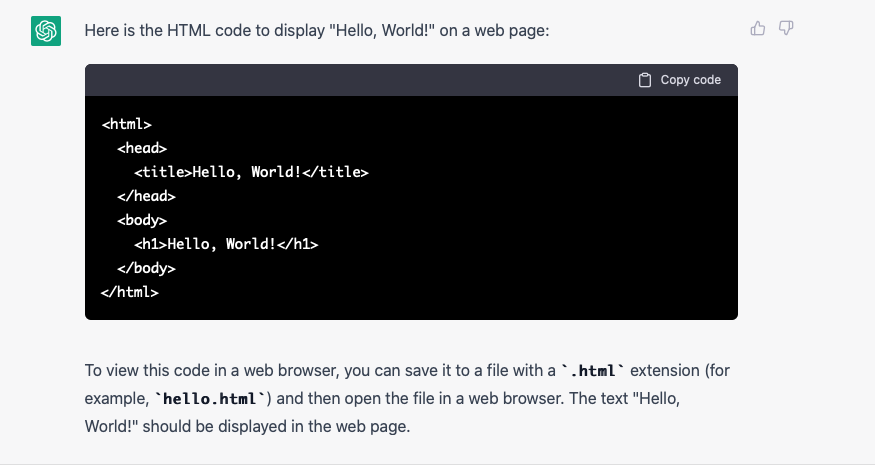ChatGPT has all the signs of being a technological game-changer. But will ChatGPT take your job?
A chatbot powered by machine learning and vast amounts of data, it interacts with users in an incredibly realistic way.
But this OpenAI-created model does much more than just carry on virtual conversations. It can generate content like poems or term papers, debug code, answer queries, and more.
This is an exciting development. But on a personal level, it’s more than a little worrying – particularly regarding its impact on job security.
If technology reaches a level where it can perform your job as well or better than you can, what are you going to do for a living?
Most people have spent their entire careers working in one field. Are they all supposed to become carpenters or massage therapists? And if so, won’t the competition for those roles be intense? How will we survive?
The thought alone is enough to induce a full-on panic attack.
But relax. Breathe into a paper bag if you need to.
Things are not as desperate as all that.
You’re going to be fine. Airplanes have a complex system of autopilot and, during a flight, are controlled mostly by computers, but pilots are there sitting and tuning the computer’s controls whenever needed.
Yes, on a long enough timescale, technology will eventually assume your current role. However, this is unlikely to happen anytime soon.
Machine learning and artificial intelligence are still in their infancy, and you’ll (hopefully) be long since retired before the machines come for your job.
And before that happens, the power of tools like ChatGPT will allow you to perform your role with much greater efficiency and effectiveness.
In this piece, we’ll take a look at some of the jobs most likely to be impacted by ChatGPT and rate their security on a scale of 1-10, with one meaning no chance of replacement by machines and ten meaning polish up your resume, because you’re about to get your walking papers.
Is Your Job Safe From ChatGPT?
Search Engine Optimization Professionals
Considering this is Search Engine Journal, our very first area of concern is about the future of SEO jobs.
There is no question ChatGPT and similar programs will change how SEO professionals work. But this is search engine optimization – change is the only constant.
And it’s already being employed by some professionals in the industry. From keyword research and strategy to content creation and reporting, ChatGPT shows great potential. But that doesn’t mean it’s coming for your job.
For one thing, no matter how powerful AI-powered programs become, they’ll never be human, which means they’ll never have our creative ability or mental quirks (although ChatGPT is producing some impressive creative work). Current AI systems need both guided training from humans and human input to train on, which limits their knowledge of current and recent events and makes work produced by humans a core part of how they function. It also needs human fact-checkers.
And let’s not forget that now, Google considers AI-generated content to be against its guidelines. Although, the use of anti-AI-detection algorithms isn’t fail-safe.
Most businesses serious enough to employ an SEO professional (which should be all of them) shouldn’t be willing to risk the negative impact of getting flagged as spam.
Machine-driven SEO will also struggle to reconcile conflicting information and determine what is accurate.
For the foreseeable future, it seems there will be a need for humans to oversee any AI-driven SEO efforts, offering creative input, providing strategic direction, and making adjustments based on shifting search tides.
- Risk of replacement: 2/10.
Programmers
Programming is a common and often lucrative career path.
But one of the key features that keep coming up in discussions about ChatGPT is its ability to write code. Imagine it – code writing new code, never forgetting a decimal or closing bracket. It sounds like a home run.
Additionally, ChatGPT has shown an ability to pass certification exams, which could raise the bar for entry-level jobs and make it harder for junior developers to find positions.
OpenAI ChatGPT is now an AWS Certified Cloud Practitioner!
This is crazy🤯
It attempted 20 questions of my AWS Certified Cloud Practitioner practice exams.
The results are bluffing!!!
Final score: 800/1000; a pass is 720 pic.twitter.com/G7ECxIwC8j
— Stephane Maarek 👨🏫 (@StephaneMaarek) December 8, 2022
There’s just one little problem: the OpenAI chatbot is still far from being able to write complex code. Sure, it can manage “Hello, World!” in HTML, but according to industry experts, figuring out more difficult applications is still quite a ways off.
 Screenshot from ChatGPT, January 2023
Screenshot from ChatGPT, January 2023There’s also the fact that Stack Overflow banned ChatGPT after it was used to answer questions — incorrectly.
That’s not to say it won’t impact the work programmers are doing.
As the chatbot and others like it learns and improves, they’ll increasingly take over the need for creating boilerplate code like generic functions, performing quality assessments, and debugging existing code. This, in turn, will free human developers up to focus on more complicated architecture.
In addition to streamlining coding and reducing waste, AI coders could also give rise to new jobs in the field, including code prompt executers and developer advocates (go-betweens between technical workers and non-techies).
And all this additional programming power will likely give rise to new programming jobs no one has even thought of yet.
If we’ve learned one thing from Moore’s Law, it’s that the growth of technology is exponential. And for every career door that closes, multiple new ones will open.
Keep an open mind and keep learning.
- Risk of replacement: 4/10.
Pay-Per-Click Specialists
In general, PPC specialists don’t seem to be nearly as concerned with the impact of ChatGPT and other AI technologies on their job security. If you were to hazard a guess as to why it could be because they’ve already made peace with it.
If you’ve ever set up a PPC campaign, you’ve used the power of artificial intelligence, or something very similar to it, at least. Automated Rules could be viewed as a rudimentary type of AI, where you create rules for common use cases.
Using several of these rules together in a process known as automation layering, is an important step to ensuring your PPC account doesn’t drain itself in the face of a bug or other unusual event.
The possibilities ChatGPT offers to the field of PPC are just a continuation of this same philosophy. AI will automate the bidding process based on statistical learning methods driven by real-time information. It will likely also take much of the manual work out of campaign management.
And just like with SEO, it seems extremely unlikely that ChatGPT or any of its competitors will take human workers out of the equation soon. In addition to the creative aspect, human PPC specialists perform one task no program currently can: Steering the ship.
Humans understand their customers, brand, and values. And this means, for the foreseeable future, a person will need to chart a logical course for every business.
Likewise, a human will be required to teach AI which decisions it should be making, as well as diagnose what went wrong when things get off track.
Read this for a thorough analysis of AI and PPC.
- Risk of replacement: 2/10.
Writers
As you can probably imagine, this is one area of particular personal concern. What are people like me, who depend on creating the written word going to do when ChatGPT and the like can come up with a better, snappier, more effective headline in less time?
This wasn’t much of a concern when computers were spitting out incomprehensible dialogue, ala “Sunspring,” the 2016 short film written entirely by AI. And then we got ChatGPT.
A query for the plot of a horror film about a haunted pocketwatch returned an incredibly coherent (and interesting) synopsis. This means even creative writing work could be at risk.
 Screenshot from ChatGPT, January 2023
Screenshot from ChatGPT, January 2023Until you run a second query for a horror film about a haunted cemetery. Which prompts ChatGPT to give you a similar synopsis with slightly different plot points.
 Screenshot from ChatGPT, January 2023
Screenshot from ChatGPT, January 2023Is it different enough to pass copyright laws? Yes. But that’s not to say it’s not formulaic and uninspired.
So, creativity does provide some sort of shield for writers (for now), but what about non-creative writing, journalism, whitepapers, etc.? Surely ChatGPT is a worry in those fields, considering it has become convincing enough to inspire concerns about academic cheating?
At the moment, the way AI systems are trained means they don’t have access to the latest events, which makes them unsuitable for breaking news and new developments.
Furthermore, using AI to build the connection and empathy of copy written by a living person might be quite difficult, especially in journalism and creative work where voice, nuance, emotion, and style matter.
There are several more routine writing tasks that AI can do very effectively, such as creating product descriptions, ad copy, video synopses, and other time-consuming and repetitive jobs.
While it does seem likely that automated intelligence will subsume some of the roles of professional writers, the day it will replace them entirely is far off. And even then, humans’ desire to create will still likely keep writing a popular activity.
- Risk of replacement: 4/10.
Sales Professionals
There is no question that big data and AI can be used to revolutionize the sales process. From more accurate targeting to behavior prediction, there is little question it can be used to make sales easier and more efficient.
You’ve probably already seen the effect in your own life as retailers collect and analyze your buying habits to make predictions. Those store reward cards and discount key fobs exist for just one reason: to collect your data for analysis.
It’s been going on for quite some time now, too. Way back in 2012, Target data-mining identified a teen girl’s pregnancy before her father even knew about it. And it has only gotten better since then.
Surely, this means the sales occupation is headed out the door, right? Not even close.
Legislators, especially those in Europe, are coming down hard on many of the biggest tech companies that use algorithms and AI with laws focused on privacy and consumer protection. Google is reducing user tracking; third-party cookies are going away. The technological leaps forward in AI may be limited in their application in sales and marketing for a long time.
Plus, ask any salesperson worth their salt about the most important thing to closing deals, and nine out of ten of them will tell you the same thing: Trust. And trust begins with personal relationships, something even the most convincing AI may never be able to replicate.
Of course, that’s not to say there will be no use for ChatGPT and the like in sales. Most sales departments already use a CRM tool to help them go after hot prospects and automate marketing. And chatbots embedded in websites have made information collection easier than ever.
Like virtually every other field discussed, ChatGPT promises to reshape the face of the sales process and automate administrative work, but it will never replace actual human interaction.
- Risk of replacement: 1/10.
Educators
If people were cold, uncaring machines, there would be no better way to educate them than by rote input. But humans are not computers, and education is about much more than transferring knowledge.
And no amount of programming, algorithm tweaking, and data processing can ever replace human intangibles like patience, discipline skills, friendliness, and genuine concern for students’ well-being.
Much like with sales, regardless of the advances in technology, it seems inconceivable that ChatGPT or another AI tool will ever be able to replace human educators.
But again, this is not to say it won’t change how things are done. From grading to progress tracking, developing personalized learning plans to improving accessibility, there are many opportunities to use this exciting new technology in the field.
- Risk of Replacement: 1/10
Attorneys
At first glance, the law seems like one field where AI is sure to make big strides. What is the law, after all, besides a codified set of instructions?
Why couldn’t ChatGPT be used to analyze legal documents, decisions, and precedents, then apply that knowledge to real-world cases?
There’s the human factor to consider.
One of the main arguments against mandatory minimum sentences in criminal trials is that every situation is unique.
This is no less true for civil trials, divorce proceedings, bankruptcy, or other legal issues. And because the legal field deals with people, not absolutes, there will always be possibilities that even the deepest AI cannot account for.
Due to the way ChatGPT was trained, basing a legal argument on its research alone wouldn’t consider at least last 12 months of cases and decisions. That could be catastrophic in some situations. Add to that its tendency to sometimes just get things wrong, and the tool might become more trouble than its worth in a legal profession.
While ChatGPT-like technology could prove beneficial to the legal field in roles like research and scholarship, automated contracts and forms, and even accelerating the judicial process, machines are not capable of rendering judgments.
Nor are they guaranteed to be free from biases, which at first glance seems to be their primary advantage over humans. Depending on how they were trained, ChatGPT and other chatbots are susceptible to dataset bias and less than 100% accuracy.
And this means the role of the judge, not to mention the power of a passionate and skilled attorney to sway opinions, is in no danger of replacement by computers.
- Risk of replacement: 1/10.
AI Isn’t Coming For These Jobs Yet
ChatGPT and other programs employing machine learning and big data in pursuing artificial intelligence can be wonderful tools. They show great promise in reducing or even eliminating a lot of the mundane day-to-day tasks you have to perform.
And we have already embraced this technology in other aspects of our lives – simply look at the popularity of Alexa and Siri or any of the brands of robot vacuums thousands of people readily adopted into their lives.
Why shouldn’t we hope that smarter machines will make our work lives easier as well? Because they will.
With that said, some industries are more likely to be replaced by machines in the next few years or decades. These include positions like receptionist, many customer service jobs, driving jobs including taxi drivers and truckers, and soldiers.
There are also rightful concerns about how AI tools like ChatGPT can be used by unscrupulous individuals or companies. From students cheating in college to fake scientific abstracts, whether AI tools cause damage depends a lot on how we use them. Some employers may be quicker to try and cut costs with AI than others. But it’s likely to also see resistance due to accuracy, ethics, and political issues.
One thing is certain – for every position they replace, they will pay for it in other ways, creating new opportunities and industries as they go.
Don’t fear what ChatGPT could mean for your career just yet.
More resources:
Featured Image: Sergey Nivens/Shutterstock
Go to Source
Author: Brian Frederick




